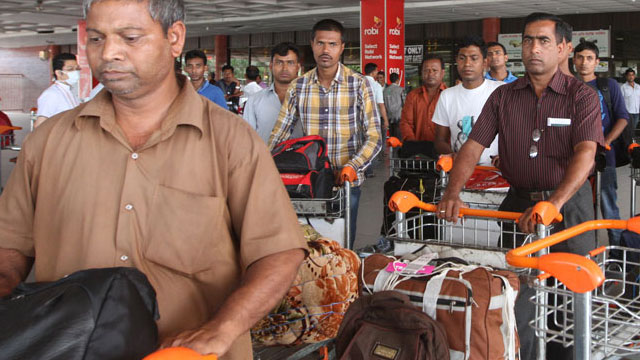Amid the ongoing crackdown on undocumented migrants in the Kingdom of Saudi Arabia (KSA), a total 250 Bangladeshi workers have been sent back from the country on Thursday and Friday.
On Friday, Saudi Airlines flight SV 804 landed at Hazrat Shahjalal International Airport in Dhaka with 120 workers. Earlier on Thursday, 130 Bangladeshi migrant workers were sent back from KSA.
The Brac Migration Program, with the help of the Expatriate Welfare desk, has provided emergency services to the migrants. Although many of the workers were sent back due to lack of documentation, some of the returning workers claimed they were forced to come back even though they had valid legal documents.
Anwar Hossain, a migrant worker from Doha upazila of Dhaka who returned from KSA on Friday, said the owner of the shop where he worked sent him back even though he had 11 months left on his work permit. Many other workers voiced similar complaints.
Also Read - Saudization, job cuts leading to deportation of Bangladeshi workers
Some of the workers said they were detained by Saudi police while they were returning to their living quarters in KSA. As their employers refused to take responsibility for them, the workers were taken to deportation camps.
Jahangeer Hossain, who was deported to Bangladesh on September 16, claimed that he had an Iqama [work permit for foreign nationals] in Saudi Arabia which was still valid for three months, but he was arrested and sent back home.
He said that 120-150 people were kept in each room at the deportation camp, where he was kept for 15 days before being deported.
According to unofficial estimates, KSA is home to about 1.1 million Bangladeshis.
Why are Bangladeshi workers being deported?
There are few job vacancies in the KSA considering the large number of migrant workers, a senior government official told Dhaka Tribune.
The official added that a recently adopted Saudi nationalization scheme, or Nitaqat, has led to layoffs of Bangladeshi migrant workers.
Rownak Jahan, secretary of the Expatriates' Welfare and Overseas Employment Ministry, said Saudi Arabia is being very strict regarding undocumented migrants.
More people are migrating to countries like Saudi Arabia for jobs, but there are more job seekers than vacancies, she said, adding that sometimes migrants have valid papers but there are no jobs for them.
File photo of Bangladeshi migrant workers pushing luggage trolleys after arriving at Dhaka airport AFP
About 12,000 Bangladeshis deported in 2019 alone
Shariful Hasan, head of the Brac Migration Program, said nearly 12,000 Bangladeshi workers have so far been deported from Saudi Arabia this year alone.
Recruiting agencies and brokers are sending people abroad without securing jobs, as they make more money if they send more people, he added.
“As per the law, migrant workers are not allowed to work under any employer they want. They have to work under the employer they signed a contract with. If they leave the job and work under another employer, they will be considered as undocumented,” Shariful explained.
“Our embassy should ask the Saudi Arabian government why they are deporting Bangladeshi migrants [even though they had valid documents], and then they can work on a solution based on their response,” the migration expert suggested.
3.8m foreigners arrested since Nov 2017
The KSA authorities have arrested around 3.8million foreigners, as it continues a crackdown on labor and residency violators, according to a report by the Saudi Press Agency (SPA).
The country has been detaining people for violating residential, labour and border security regulations since November 2017.
A total of 3,790,173 people have been arrested, including over 2.95 million for residency violations, 583,602 for breaking labour laws, and 247,220 for flouting border regulations, the report said.
The latest figures indicate that 544,521 foreigners have been arrested since early June. A total 940,100 expatriates have been deported since November 2017, the report said.





